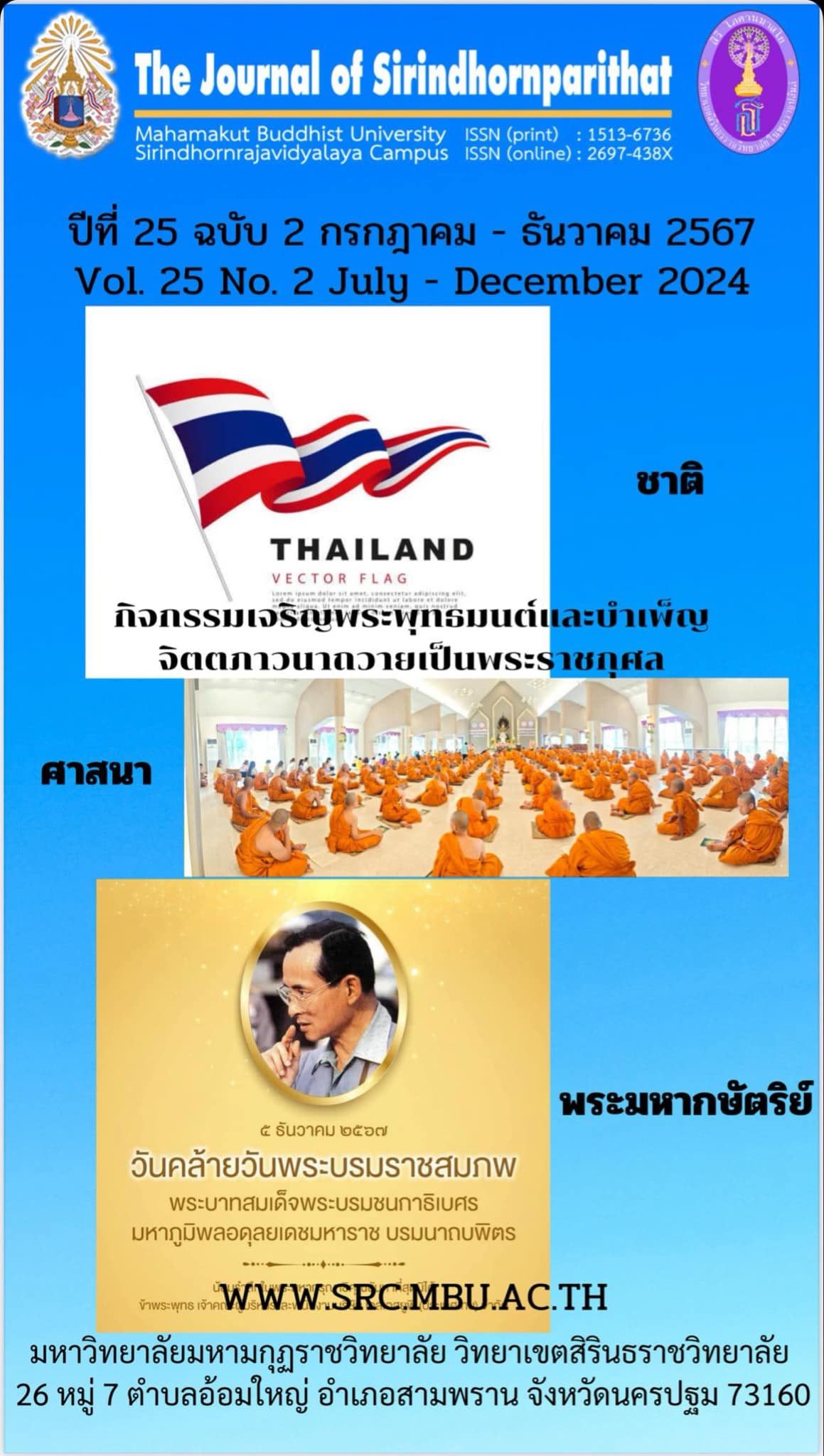การจัดการความขัดแย้งในองค์กรอย่างมืออาชีพ
คำสำคัญ:
ความขัดแย้ง, กระบวนการขัดแย้ง, การจัดการความขัดแย้งบทคัดย่อ
ความขัดแย้งในสังคมและในทุกองค์กรเป็นผลจากปฏิสัมพันธ์ของกลุ่มบุคคลภายใต้เงื่อนไขจากโครงสร้างสังคมที่กำหนดการมีสิทธิอำนาจ การเข้าถึงและได้ประโยชน์จากทรัพยากรที่มีอยู่อย่างจำกัดแตกต่างกันและไม่เท่าเทียม เงื่อนไขดังกล่าวเป็นเหตุทำให้เกิดความขัดแย้งในสังคมทุกส่วนโดยเฉพาะในองค์กรทั้งภาครัฐและภาคเอกชนที่อาศัยกลุ่มบุคคลที่มี ความคิด ทัศนคติและวิธีทำงานหรือประสานประโยชน์กันให้เกิดประสิทธิภาพแตกต่างกันเป็นกลไกขับเคลื่อนจึงย่อมเป็นเหตุให้เกิดความขัดแย้งในองค์กร ผู้บริหารมีหน้าที่จัดการความขัดแย้งที่เกิดขึ้นในองค์กรโดยตรงเพื่อควบคุมมิให้ความขัดแย้งไปลดทอนประสิทธิภาพขององค์กร
ขณะเดียวกัน เพื่อให้พลังของความขัดแย้งส่งผลต่อการพัฒนาองค์กรมากที่สุด ผู้บริหารองค์กรจึงต้องมีความเป็นมืออาชีพมองความขัดแย้งสมัยใหม่ในการเลือกวิธีจัดการความขัดแย้งได้อย่างเหมาะสม โดยเริ่มต้นจากการทำความเข้าใจกับธรรมชาติของความขัดแย้งในองค์กร ความขัดแย้งในองค์กรเป็นสิ่งปกติที่เกิดขึ้นได้เสมอ ไม่สามารถหลีกเลี่ยงได้ และส่งผลทั้งด้านบวกและด้านลบกับองค์กร สาเหตุของความขัดแย้งในทุกองค์กรที่สำคัญคือ 1) การมีเป้าหมายที่แตกต่างกัน 2) การแข่งขันด้านทรัพยากร 3) การสื่อสารบกพร่องและข้อมูลที่ผิดพลาด และ 4) ความเห็นต่อมาตรฐานการปฏิบัติงานไม่ตรงกัน
ความขัดแย้งในองค์กรมีลักษณะเป็นกระบวนการ ประกอบด้วย 5 ระยะ ได้แก่ ระยะที่ 1 ก่อตัวของการต่อต้านไม่ลงรอยกัน ระยะที่ 2 การรับรู้ถึงความขัดแย้ง ระยะที่ 3 ตั้งใจทำอย่างใดอย่างหนึ่ง ระยะที่ 4 การแสดงออก และ ระยะที่ 5 ผลลัพธ์ที่เกิดขึ้นจากความขัดแย้ง ผู้บริหารมืออาชีพต้องอาศัยเทคนิควิธีการจัดการความขัดแย้ง 5 รูปแบบ คือ 1) การแข่งขัน 2) การประนีประนอม 3) การร่วมมือ 4) การหลีกเลี่ยง และ 5) การยินยอม อย่างไรก็ตามเทคนิควิธีการจัดการความขัดแย้งแต่ละรูปแบบจะมีทั้งข้อดีและข้อเสีย ผู้บริหารองค์กรต้องอาศัยการเจรจาต่อรอง การไกล่เกลี่ย การประนีประนอมร่วมกับทุกฝ่ายในการจัดการความขัดแย้งให้เหมาะสมกับสถานการณ์ที่มีลักษณะแตกต่างกันเพื่อให้บุคลากรในองค์กรทุกคน ทุกฝ่าย ทุกระดับสามารถสร้างผลงานได้อย่างมีประสิทธิภาพในสภาพแวดล้อมที่เป็นมิตรอย่างยั่งยืน
เอกสารอ้างอิง
จิตราพัชร์ ชัยรัตนหิรัญกุล และ ธานี เกสทอง. (2556). การศึกษาการจัดการความขัดแย้งในสถานศึกษาของผู้บริหารโรงเรียน สำนักงานเขตพื้นที่การศึกษามัธยมศึกษา เขต 42. วารสารวิชาการเครือข่ายบัณฑิตศึกษา มหาวิทยาลัยราชภัฏภาคเหนือ. 3(5): 137 - 152.
นงนาฏ จงธรรมานุรักษ์. (2544). กลยุทธ์ในการบริหารความขัดแย้ง สำหรับผู้บริหารการพยาบาล. วารสารสภาการพยาบาล. 16(4): 41 - 51.
นวพร ชิณวงค์. (2558). ความขัดแย้งในองค์กรด้านงานความสัมพันธ์และด้านกระบวนการที่มีความสัมพันธ์กับการรับรู้ความเครียดในการทำงานของพนักงานระดับปฏิบัติการเปรียบเทียบระหว่างธุรกิจอสังหาริมทรัพย์และธุรกิจค้าปลีก. วิทยานิพนธ์ปริญญาบริหารธุรกิจมหาบัณฑิต วิชาเอกการจัดการทั่วไป. มหาวิทยาลัยเทคโนโลยีราชมงคลธัญบุรี.
ปัณณพงศ์ วงศ์ณาศร. (2558). ความขัดแย้งและการจัดการความขัดแย้ง : บริบทในสังคมไทย. วารสารสำนักหอสมุด มหาวิทยาลัยทักษิณ. 4: 59 - 81.
รัฐพล เย็นใจมา และสุรพล สุยะพรหม. (2561). ความขัดแย้งในสังคม : ทฤษฎี และแนวทางแก้ไข.วารสาร มจร สังคมศาสตร์ปริทรรศน์. 7(2): 224-238.
สุตาภัทร จันทร์ประเสริฐ. (2560). ความขัดแย้งในองค์กรธุรกิจ : แนวทางป้องกันและแก้ไข. วารสารวิชาการมหาวิทยาลัยปทุมธานี. 9(1): 218-226.
อร่ามศรี ศิริพันธ์. (2525). ความขัดแย้งในองค์กร: เครื่องมือของนักบริหาร. วารสารสังคมศาสตร์. 19(2): 51-61.
Lewis Coser. (1956). The Functions of Social Conflict. New York: The Free Press.
Louis R. Pondy. (1967). Organizational Conflict: Concepts and Models. Sage Publications, Inc. 12(2): 296-320.
Montana, P., & Charnov, B. (2008). Management (4thed.). New York: Barron’s Educational Series.
Robbins, S.P. (2003). Organisational behaviour (10THed.). San Diego: Prentice Hall.
Stephen P. R. (1983). The Theory Z Organization from a Power-Control Perspective. California Management Review.
Thomas, K. W. & Kilmann, R. H. (1987). Thomas - Kilmann conflict model interest. New York: X/COM Incorporated.
Van Slyke, E. J. (1999). Listening to Conflict: Finding Constructive Solution to Workplace Disputes. New York: AMACOM.
Wall Jr., J.A., Callister, R. R. (1995). Conflict and Its Management. Journal of Management. 21: 515-558.
Wells, Margaret A. (1979). Siroi Grammar. (Pacific Linguistics, Series B, 51.) Canberra: Australian National University.
William A. Pelz. (2011). (Karl Marx) Das Kapital: A Critque of Political Economy, 1818. Paperback.
Wongwanich, B., & Laohavichien, T. (2017). Conflict management and organizational Citizenship behavior. RMUTT Global Business and Economics Review. 12(2): 34-45.
ดาวน์โหลด
เผยแพร่แล้ว
ฉบับ
ประเภทบทความ
สัญญาอนุญาต
ลิขสิทธิ์ (c) 2024 มหาวิทยาลัยมหามกุฏราชวิทยาลัย วิทยาเขตสิรินธรราชวิทยาลัย

อนุญาตภายใต้เงื่อนไข Creative Commons Attribution-NonCommercial-NoDerivatives 4.0 International License.
บทความที่ได้รับการตีพิมพ์เป็นลิขสิทธิ์ของ มหาวิทยาลัยมหามกุฏราชวิทยาลัย วิทยาเขตสิรินธรราชวิทยาลัย
ข้อความที่ปรากฏในบทความแต่ละเรื่องในวารสารวิชาการเล่มนี้เป็นความคิดเห็นส่วนตัวของผู้เขียนแต่ละท่านไม่เกี่ยวข้องกับหาวิทยาลัยมหามกุฏราชวิทยาลัย วิทยาเขตสิรินธรราชวิทยาลัย และคณาจารย์ท่านอื่นๆในมหาวิทยาลัยฯ แต่อย่างใด ความรับผิดชอบองค์ประกอบทั้งหมดของบทความแต่ละเรื่องเป็นของผู้เขียนแต่ละท่าน หากมีความผิดพลาดใดๆ ผู้เขียนแต่ละท่านจะรับผิดชอบบทความของตนเองแต่ผู้เดียว




